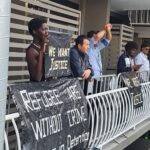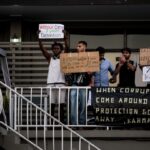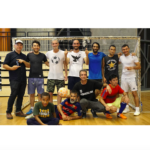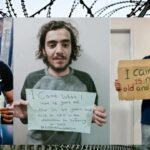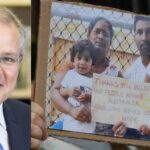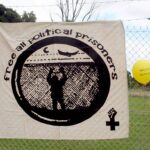“Torturing Innocent People”: Activist Claire Gomez on Freeing the Park Refugees
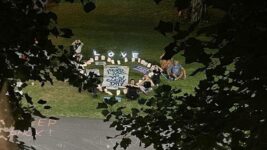
After having locked up Novak Djokovic in the same immigration prison as over two dozen former offshore detainees – whilst his government drew out the media spectacle around whether to deport him – the PM decided to tell a blatant lie about the men inside.
Following the tennis star getting the boot out of the country, Scott Morrison appeared on 2GB to tell host Ben Fordham that the 32 men detained inside Melbourne’s Park Hotel – which is now classified as an alternative place of detention (APOD) – weren’t refugees at all.
This is far from the truth, however, as twenty five of these men have been processed as refugees, while the remaining seven continue to have the status of asylum seekers. And under international laws this nation is a party to, the government is obliged to provide asylum to those found to be refugees.
But, not to worry, at a press conference two days later, Morrison explained that he’d simply been mistaken. And he added that the refugees are still in detention – close to nine years after having arrived in Australian waters – as their cases are at various stages regarding where to be located.
Political pawns
The 32 men inside the Park Hotel were flown to Australia from offshore detention after federal parliament passed Medevac laws, which provided that those being locked up overseas would be brought here to undergo medical treatment if needed. But the government was against the move.
Prior to Medevac being revoked, 192 long-term offshore detainees were flown to Australia. The Morrison government then turned a number of hotels into APODs, and imprisoned these people with compromised health inside them, often without ever receiving the needed treatment.
Over the early days of the pandemic, a sustained community campaign to have these men freed was waged, with a handful being released in late 2020. Then, early last year, over 100 more were released into the community, despite the government claiming this would never be possible.
So, now it appears that the final 32 men – who passed a tailored security check before being flown to this country – are being kept in the hotel to act as sacrificial examples. And these men have no idea why they’ve been singled out for this ongoing indefinite detention.
Heartfelt activism
Refugee rights activist Claire Gomez is amongst a group of protesters currently stationed outside the Park Hotel, which is situated in the inner city suburb of Carlton. And they’re determined to see these last men freed.
Gomez has been on the frontline of the campaign to free the refugees for half a decade. Her concerns were spiked when the mandatory offshore detention regime came into play. But it was after she began communicating with them via social media that she became an ardent supporter.
Sydney Criminal Lawyers spoke to Claire Gomez about what’s kept her going through her years of campaigning, the state of the men currently in the Park Hotel, and how she considers this nation has to change moving into the future.
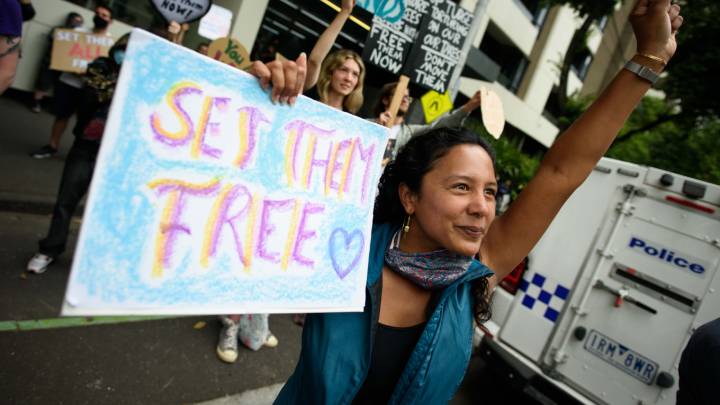
Claire, you’re currently amongst a group of refugee advocates, who are camping and demonstrating outside the Park Hotel in Melbourne, due to the 32 men, most of whom have been processed as refugees, being detained inside the building.
These men who fled persecution in their countries of origin have been in Australian detention going on 9 years now.
How would you describe the state these men are in after all this time?
They’re honestly at the lowest I’ve ever seen them over the nine years of detention. I’ve been friends with some of them for five years.
It’s the sensory deprivation that’s the hardest, because they’re locked in these little white concrete rooms, staring at the walls.
Some of these rooms don’t even have windows to the outside world. Some have an internal window that looks at another wall with an air conditioning unit on it.
They were medically evacuated from offshore two years ago. So, this has been their lives for those two years.
Australians have been horrified by two weeks of quarantine, but this has been years. And the refugees have much less freedom than Australians have in hotel quarantine.
They can’t even choose the food they eat. They’ve had all rights and autonomy taken away from them.
I believe the windows have been sealed shut at the Park Hotel.
That’s right, all the windows are sealed. And the windows to the external world were tinted by the guards to try and prevent so much interaction with the people outside showing their support.
And they were all kept in there when a COVID outbreak happened inside?
None of them are allowed out. So, it was clearly the guards that brought COVID in.
Initially, there was the one case. But they did nothing to mitigate the others getting it. So, they were just locked up in there with people catching COVID. It just kept spreading and spreading.
You would think they would take them out, so the other people wouldn’t get it, but they were just left in there to spread COVID.
In the end, 26 people got COVID through negligence. It’s clear that’s going to happen if you lock people up together in a building without good ventilation.
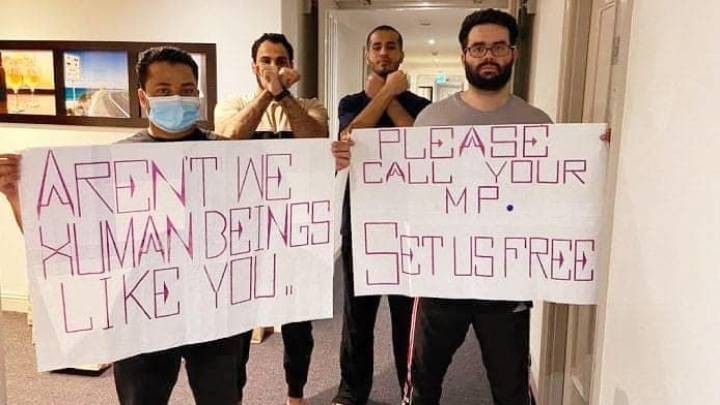
The cancelling of Novak Djokovic’s visa, his detainment in the Park on a different floor to these men and his subsequent deportation was frontpage news for a number of weeks.
This situation served to draw renewed attention to the Park refugees, some of whom have been in there for over 12 months now.
What’s your take on the Djokovic saga? And how would you say it reflects on the men’s plight?
I was surprised that the men weren’t more excited that he was locked up with them. They actually said how they wouldn’t wish it on anybody.
I’m not particularly interested in the rights or wrongs of Djokovic’s visa cancellation or his vaccination status.
But I am grateful that whoever made the choice to lock them up with the refugees did so, because it brought so much attention internationally.
We’ve been trying to get that international attention for a long time because people don’t understand the situation. And if they did, then they would be horrified.
The more people that come to understand the situation, the closer we are to freedom for these men.
You’ve been an ardent supporter of the refugees who arrived in Australian waters seeking asylum almost a decade ago and were subsequently locked up in prisons built on poor island nations that this country used to administer.
What drives you in this regard?
I’m invested in this because this detention is so illogical.
There are a lot of difficult circumstances in Australia, like homelessness, but generally speaking, there are structures and services in place to try and support or help those communities.
Whereas this situation is a billion-dollar structure created to actively harm refugees.
The figures are astounding. It costs $450,000 per person per year to lock them up in the hotel. And that’s not to provide care for them. People are profiteering here.
In Nauru, it costs $4 million per person per year.
So, there’s this incredible money-making machine on the backs of torturing innocent people who’ve had to flee for their lives. That’s what really gets to me, and that’s why I’m so passionate about resolving this issue.
There are only 280 refugees left from this offshore cohort, and that’s a drop in the ocean for our migrant intake. And we desperately need migrants at the moment.
It’s often said that the government takes the tough on borders position because it wins votes. And it’s thought if the wider population spoke up, the whole mandatory detention regime would come to an end.
How do you feel about the way the wider Australian community has been acting over the last decade in this regard?
That has been the hardest part of the journey for me: the lack of engagement from the Australian community.
There are just pockets of Australians who are kind and committed. They know that this is wrong. And they’ve helped me through this journey.
The main thing is that if people understood they’d care. So, when they’re given the opportunity to properly understand the situation, then they care and are against it.
So, that’s the most important thing, finding out the details of what’s really happening to these innocent people, some of whom have been locked up for more than a third of their lives.
You’re back out the front of the Park, calling for the release of the detainees. What do you expect to happen from here?
Exactly one year ago, 60 refugees were released from this very hotel. So, we know it’s possible.
It came at a time when the pressure was really on the government. The rallies were so big. There were cases in the court.
The government then said it was cheaper to keep them in the community and released 60 of them.
So, it’s easy to do and there are no obstacles to doing it. We’re just keeping the pressure on the government, particularly with the election coming up.
And lastly, Claire, what sort of broader changes does the decade-long treatment of these people reveal needs to happen?
Papua New Guinea declared that the way the Australian government was locking up people over there was illegal. So, they weren’t able to lock them up on Manus Island anymore.
They’re not adding new refugees to this detention regime, so there are just a few left who have unfortunately been trapped.
Independent Andrew Wilkie has a bill that’s attempting to make indefinite detention illegal, and that’s coming up in a few days. So, people are encouraged to write a submission to that.
That’s the kind of change we need to see in the country. We need more reasonable treatment of people who come here seeking asylum.


